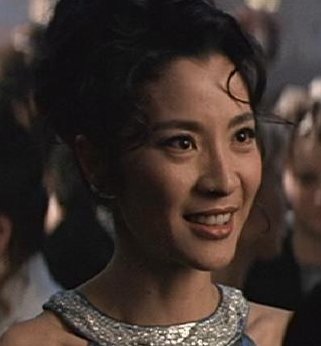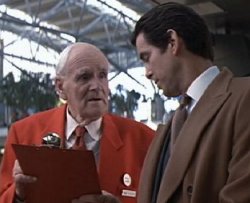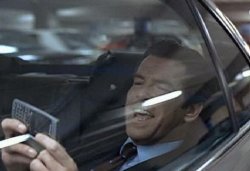Bond is such an institution that everyone you know gives you ideas.
More action. Better girls. Faster cars .... But you have to be careful.
One would not like to be known as
the guy who ends the series.
- Roger Spottiswoode, on set
Tomorrow Never Dies
Film: 1997 (#18)
Book: n/a
The USS Devonshire, believing itself to be in international waters off China, is threatened by Chinese planes who claim the ship is in their territorial waters. Suddenly the ship is hit (and sunk) by an apparent torpedo and one of the planes is downed by what appears to be a missile from the ship. However, it is all a plot; the ship has been driven off course by a satellite which is interfering with GPS data, the "torpedo" is actually a sea drill fired from a boat covered in anti-radar stealth plating, and the missile is from the stealth boat as well. Bond is ordered by M to follow the only lead they have - that mysterious satellite - which is owned by mad media mogul Elliot Carver. Carver is trying to start a war in the South China Sea so as to sell newspapers, among other things (part of his scheme is a deal to get exclusive satellite broadcast rights in China). Bond first tries to approach Carver's wife Paris - whom he dated, once upon a time - and Paris is killed because of it. Later he ends up teaming with Chinese Intelligence agent Wai Lin, who is investigating Carver for related reasons of her own. Bond and Wai Lin figure the scheme out and end up sabotaging the stealth boat enough to make it visible to radar, whereupon the Chinese say "good hunting" and British blow it apart ....
Himself
This film shows Bond in definite "I will walk in and cause chaos" mode, from the very first seconds. This is my favorite pre-credits sequence in a Bond film, because it shows succinctly what Bond is all about: He comes in, he causes destruction, he knows what he's doing even when his superiors don't, and he gets the job done. Furthermore, it's established that M trusts him to know what needs doing even as she worries sometimes about the methods he uses to pull it off.
Bond's cover story to Carver is not, I think, meant to withstand scrutiny. He comes in knowing it will be blown instantly; his purpose is to shake Carver up and see what happens. Unfortunately this costs Paris' life - and thereby we find one of the big weirdnesses of the movie.
The Women
Paris is written out very cavalierly and deliberately, and many of the things which just don't wash about the film have to do with her. Bond doesn't want to involve her, it's established - watch his resentment in the very well-handled car briefing scene; he's annoyed that this would even be fair game. But then he strides into the party in a way which he must surely know would backfire badly on her. Why not approach her when and where Carver can't see it?
Bond really is the person responsible for getting Paris killed, as the film says, and that stings ... but even worse, depending on how you read the data, he did it deliberately. Certainly it would explain the rare emotional response from Brosnan that is completely unconvincing (his reaction to Paris' death), or the fact that, though he is allegedly expecting an assassin, he downs an astonishing amount of vodka while waiting - Bond isn't that stupid. I think he is actually expecting Paris in his hotel room, dialogue notwithstanding, and he knows how this will end up.
In the real world, of course, there are varying stories about the extent to which Teri Hatcher's part was cut. It seems clear that at least some of it was left on the cutting-room floor after test screenings, and there is some evidence that her performance was not highly regarded (I believe it). Her filming was also probably truncated because of her pregnancy (certainly a bedroom scene with Bond was cut for this reason). But my suspicion is that only her amount of time in the film would have differed - that they probably always intended to use her merely to further the plot and be callously discarded.
It's also possible they fridged Paris when they realized they had something much, much better in Michelle Yeoh as Wai Lin.

"You don't have a Beijing bureau, Mr. Carver."
I'm glad she got a major English-language action film at least once in her career, and I'm glad they wrote her a fight sequence which shows her at her best - close-up fistfighting in the Hong Kong style. I don't think she and Bond necessarily have a lot of chemistry together, but they have something which is possibly even rarer: They convey mutual professional respect, even when sparring. Bond fusses and argues and would prefer to drive the motorcycle, but he takes Wai Lin seriously from square one, when he sees her at the party (I like to think that he knows her cover is phony, just as she knows his is).
Backstory
Bruce Feirstein came back as writer, and reportedly clashed with director Spottiswoode (Martin Campbell didn't want to do two Bonds in a row) over script decisions. Between this and trouble with location shooting (the Vietnamese government suddenly decided to rescind permission to shoot there, and they had to hastily find locations in Thailand instead), and a chaotic early shooting schedule (the script was still unfinished, partly due to the death of the Hong Kong plotline - see below - and neither Pryce nor Hatcher had been cast), the film had a much more rocky production than it may look.
John Barry was asked back for the music but with the condition that he couldn't touch the title song, which had already been given to Sheryl Crow. He felt this would prevent him from doing a proper job and declined. David Arnold, who took the job, reportedly didn't like the restriction or the song, which is why there is a separate song in the end credits (and quoted musically throughout the rest of the film), written by Arnold and performed by K.D. Lang. (I seldom talk about Bond songs here because, unless Shirley Bassey sang them, I don't tend to remember them much at all.)
As noted on the previous page, the Leavesden space was unavailable due to Mr. Lucas, so EON did a conversion job again, this time on a former grocery warehouse in Frogmore. The stealth ship interiors were done at Pinewood. Many of the South China Sea bits were shot in locations around England. The "bazaar" in the pre-credits sequence, supposed to be somewhere in Afghanistan I believe, was actually shot in the Pyrenees.
The Briefing
I'm not sure what attracts me to this movie. It's a strange Bond film structurally; it kills off a major character as if deciding "no, no, that was a mistake, let's try again," it has off-and-on pacing, not-especially-compelling villains, and an oddly anticlimactic final twenty minutes. And yet I consider it a pretty good Bond film. Is it possible it's still because I'm so het up about Brosnan? At any rate, I do note that on repeat viewings I don't find it nearly as charming as I did when I first saw it.
It's been noted that this, even more than many of the other Bonds, is a "the plot just serves to bring us to the next action sequence" film. There's some truth to that, but we do also get the lovely bickering between M and Admiral Roebuck (presumably Judi Dench and Geoffrey Palmer were old hands at this after all those years of "As Time Goes By"), the wonderful sequence with Jack Wade (alas, making his final appearance), the sequence with Vincent Schiavelli as Dr. Kaufman, and Ricky Jay as Henry Gupta.
Unfortunately Jay (who is always good, but quite understated) and Schiavelli (who hams it up, but in an appropriate and interesting way) are the best of the villain crop, which is not saying a lot. One of my books calls Jonathan Pryce's performance as Carver "hugely amusing"; I call it simultaneously shallow and hammy. Pryce is phoning it in and doesn't give a damn about the character, and it shows. You can't play a megalomaniac entirely for laughs; you have to also make him scary. Carver is so not scary that the film kills him off before the key henchman - tsk! At least Götz Otto manages to be menacing, in the Red Grant school, as Stamper. (Otto's self-introduction during auditions was reportedly "I am big, I am bad, I am German," which really was all that needed to be said about that character.)
Maybe we should focus on the action sequences here, which are excellent, notably the pre-credit sequence, the soundproof room fight at Carver's party, the remote-controlled car sequence, and the long sequence in Saigon with two on a bike, several Range Rovers, a very nice Michelle Yeoh brawl, and a helicopter which manages to be the most frightening thing in the movie. It's only the action at the very end of the movie which is a letdown.
In the real world, Feirstein's original script idea was to play off the impending return of Hong Kong to China, with Carver trying to sabotage it. Spottiswoode claims the idea was kiboshed by none other than Henry Kissinger, who noted that if something actually did happen during the handover, the film would suffer badly for it. (The handover would be addressed, albeit after the fact, in Die Another Day.) Instead what we ended up with is a referendum on corrupt media moguls, plus a nod to the Chinese style of action films, which Western pop culture was finally discovering and finding good.
The plot is made somewhat scarier by the sheer callowness of the villain's motivation: He just wants to sell papers. This is an obvious Hearst reference ("You provide the pictures, I'll provide the war,") but there are other real-world figures in the mix: Carver's interest in getting world satellite coverage is a definite nod to Rupert Murdoch, and M's press release at the end is a reference to newspaper baron Robert Maxwell who drowned, suspiciously, while in the Mediterranean on his private yacht.
Here China is used in the same way Russia was used during the Moore years; not outright bad guys, not unsympathetic, just misguided. A big looming danger, but not actually hostile. This wasn't unrealistic given the state of Chinese relations with the western world in 1997. The unrealistic part is, once again, that Britain would even be involved - they are again standing in for the US. As one of my books points out, the idea of England "sending in the fleet" was pretty hilarious overestimation even then, and it's more hilarious now. On the other hand, the film at least pays lip service to this: Jack Wade's comments make explicit that the US is watching and maintaining official distance but unofficial concern. So perhaps Carver deliberately involved England and not the US in his scheme? Maybe he knew that the US response would not have been the one he wanted? We can theorize all day.
Obscura
Lest you consider the stealth boat unbelievable, please note that not only is it possible but its unusual design is actually close to what would be required to get the angles right. If you look in the book Skunkworks by Ben Rich, which among other things has the inside story on the design and development of the Stealth fighter, you'll see photos of the Sea Shadow, the stealth-ship prototype, which has very similar lines.
The gent you see talking to Bond in the pre-credits sequence is Charles Robinson, played by Colin Salmon. This character was a replacement for Bill Tanner - Michael Kitchen was unavailable for this film, but they did not want to recast the character because they knew he'd be back - and in fact both Robinson and Tanner would appear in the next one.
Michelle Yeoh was used to doing all her own stunts, and was reportedly upset that she couldn't do more of them on this film for insurance reasons. Certainly a large percentage of the stunt work for the character is actually her.
Producer Michael Wilson gets some actual dialogue here in his usual cameo - he's the Carver bureau chief ordered to slime the President. Gerard Butler is somewhere among the key Devonshire crew.
The inexplicable title of this film was supposed to be Tomorrow Never Lies, referring to Carver's newspaper Tomorrow. The usual story is that it was a typo in early drafts (some say a fax which was misread) which stuck.
A subtle and indirect joke comes during Carver's broadcast speech. You might miss it because it's going on during the soundproof room fight, but, Carver - after some megalomaniac rhetoric which is hilariously excessive - then turns about and announces his "declaration of principles" for delivering the news honestly and fairly. This is a nod to Citizen Kane, which was itself a riff, in its way, on Hearst.
Minor touches not to be missed:
Bond's continual reaction shots at Q's red Avis coat, which Q is oblivious to.

His later reaction shot to Wade's attire, which Wade does not miss. (Wade responds by looking at Bond's Navy uniform as if Bond is seriously overdressed.)
Wai Lin's polite-smile reaction to some of Bond's bad jokes.
Two "gotta light?" jokes - one in pre-credits, one in Saigon - which are direct responses to the new non-smoking Bond.
Bond's grin at the reinflating tires of his car, and another grin at the end of his "safe and pleasant trip."

Then he catches himself and deliberately puts his composure back on. Very nice.
There's a fair amount of very subtle CGI/post-production work in this movie, including the propeller blades on the helicopter when it's moving through the streets at a steep angle. The Carver building in Saigon is constructed by computer on top of shots of a real, but very different-looking building.
I have said it before and I will say it again: Underwater sequences just don't work. No more dive photography! Ever!
The island that Bond and Wai Lin explore from the sea when trying to find the stealth boat is the same island that was Scaramanga's hideout in Golden Gun - Ko Phing Kan, AKA "James Bond Island."
Speaking of natives, it amazes me how complacent some of the people in the Saigon ghettos seem to be about motorcycles crashing through their humble homes and destroying their possessions. Couldn't we have shown some abject panic or anger or even mild irritation?
The whole sequence with Bond at Oxford, "brushing up on a little Danish," is too Moore for me - especially when capped by an absolutely horrible Moneypenny single-entendre I can't even bring myself to type. Fortunately the scene is redeemed by M's absolutely unamused stare after the line. I'm not amused either.
« Heavy Bondage
« Opening Titles
All material on this site is under copyright by its author, except for quotations and images used for purposes of commentary (and which belong to their respective owners/authors). All rights reserved. Do not reproduce without express permission. Correspondence goes to projectionist at shrunkencinema dot com. No guarantees. Contents may settle during shipping; this product is sold by weight, not by volume.
These pages and their author have absolutely no affiliation whatsoever with Ian Fleming (Glidrose) Publications, EON Productions, Danjaq LLC, MGM/UA or any other creators of the James Bond novels or films.